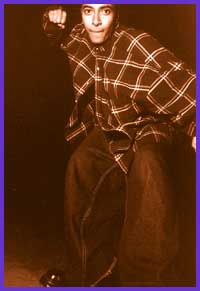Nowhere in the world is there a festival like Desh Pardesh. For 12 years, South Asians from around the globe have come to talk openly about liberation from oppressive dogmas – whether it be Hindu fundamentalism or your parents forcing you to be a doctor and straight.
Success, however, has brought problems.
“Desh is suffering from a loss of cultural memory and grounding in the values that originally propelled it,” says artist Sharon Fernandez, among the first participants at Desh (she is currently working at the Canada Council as an equity coordinator).
Critics point to the creative spirit and spirited dialogue of the festival’s early years.
Nelson Carvello, a founding member of Khush (Toronto’s South Asian queer boys club) and one of the original organizers of Desh Pardesh, says: “The first years of Desh were very political, creative, exciting and scary all at the same time!” In 1986, the Khush boys, with the help of the Gay Asians Toronto, organised an event called Salaam Toronto (Desh’s predecessor) at the 519 Church Street Community Centre.
“We wanted to expose our families to our realities as queer South Asians,” says Carvello. “And at the same time we also wanted to expose the white gay and lesbian community to our lives in more than a tokenistic fashion. There was so much creativity and we had a lot of fun, but the vision was always about outreach – outward and inward.”
Carvello recalls the early years as exhilarating – and intimidating – because people at different stages in their political evolution, were giving voice to numerous points of view.
He remembers one night, in particular: Sunera Thobani was screening one of her films. Afterwards, someone in the audience got up and argued that the film had no class analysis. Then others jumped up and responded with “look at your own class background and don’t assume what class people are.” The discussion went back and forth. Carvello remembers it to be heated and totally engaging. He says that this kind of spontaneous feedback was happening all the time.
Using words like alienation and disappointment, some South Asians feel that the heat has cooled in the last three or four years. Local lesbian and long time Desh contributor, Leela Acharya, thinks that “Desh has strayed from the radical hot bed of politics and culture that it started out to be.” The festival has become “clique-ish, self-indulgent,” she says, by becoming a showcase of names and personalities. It’s no longer a gathering place where everyone gets a chance to speak and come away with a renewed sense of hope and vision.
The critique is often vigorous because Desh is more than just a festival: It means family to so many South Asian people. And not unlike family, it has had its share of sibling rivalries, totalitarian defensive parents, and even the favourite children who get all the props and attention.
And just like family, all the kids keep coming back, looking for love and acceptance. Acharya laughs as she confesses: “No matter what I say, when Desh comes around every year, I buy the pass and go to everything. It is the only place where I feel like full representation of my reality is possible.”
“This year we are trying to create a respectful dialogue between all of the community members,” says Mark Haslam, a member of the Desh programming committee and a long time contributor to the South Asian queer community. “People are at different stages when they come together at Desh. They have different vocabularies, and these vocabularies are constantly changing. Our intention is to encourage this discussion in a way that isn’t alienating.”
Organizers have structured the festival so that there is a lot of time between events for meals and discussion. There will be a Q&A after all the programs so that presenters and audience members can speak with each other, and the MC’s are being trained to put the performances in context, while encouraging all questions and comments. Also, there is “Culturally Informed Critical Writing,” a project (supported by a workshop of the same name) where all festival attendees are invited to review any program at the festival. Articles will be posted at the festival mainspace and archived for future reference.
Desh organizers say they are committed to reviving the original values and politics. Haslam states that much of the responsibility also belongs to the audience. “Desh is meant to be a catalyst for discussion, and then it is up to the audience to re-interpret and re-invent the circle of meaning that they get from Desh.”
Part of the shift includes more integrated programming, with a move away from identity-based programs, like a women’s night or a queer night. The hope is to present a more inclusive and fluid presentation of progressive South Asian voices.
Desh Pardesh.
$8-$10 evening programs.
PWYC workshops.
Thu, Jun 10-13.
Various venues.
(416) 340-0485.

 Why you can trust Xtra
Why you can trust Xtra


